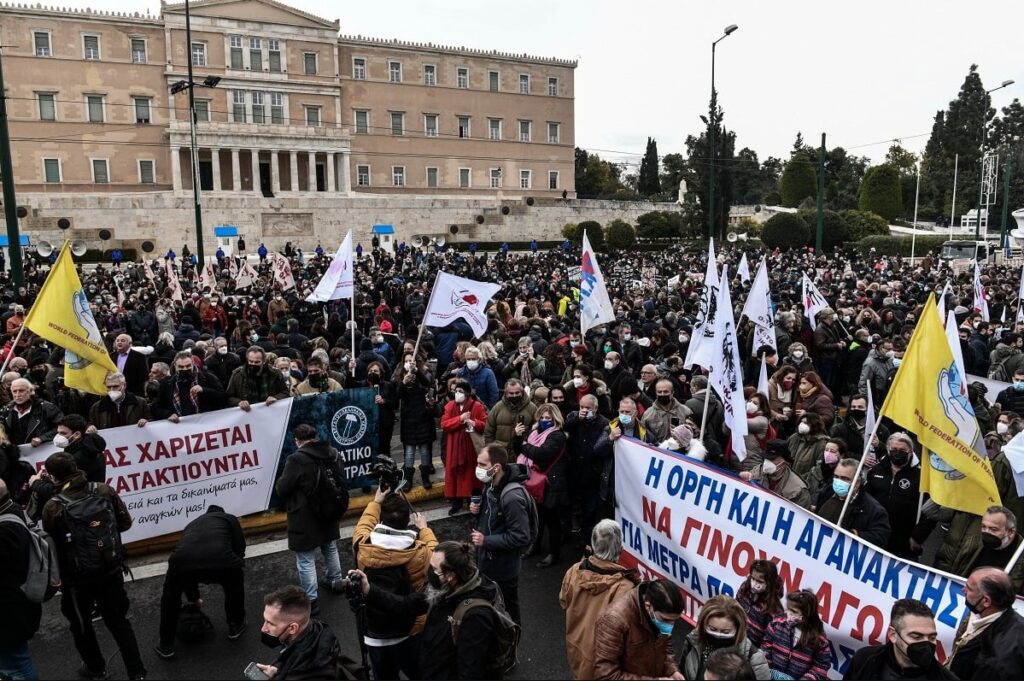Even before the cost of living crisis was formally pronounced, it had arrived in Greece. For many it was not in the increased number of homeless on the streets, or beggars huddled around tourist sites, or eye-wateringly high energy bills – although all of those existed before Russia’s invasion of Ukraine.
“It was there for everyone to see on the supermarket shelves,” says Panagiota Kalapotharakou, who heads the consumer rights association Ekpizo. “Eighteen months ago there were so many products with price labels that a great number of Greeks could not afford. Costs were going up long before the war in Ukraine.”
It came as little surprise for consumer groups, then, that when talk turned to the need for relief measures to counter rising inflation the government chose to focus on staple goods. What emerged was the novel concept of the “household basket”: supermarkets agreed with the government to sell about 51 staples – from flour to fish – at fixed prices.
The measure, thrashed out around a long mahogany table in the ministry of commerce, went into effect in early November. Officials in the centre-right government intend the scheme, scheduled to run to the end of the winter, as a bulwark for the most vulnerable against the inflationary storm. No government subsidies are involved.
“We spent weeks sitting around this table working on it with supermarket market representatives and our competition committee,” says Sotiris Anagnostopoulos, the ministry’s fresh-faced general secretary. “In politics you have to anticipate what is coming next. The cost of living crisis is a huge challenge, maybe the biggest we have faced since the adoption of the euro.”
Nationwide chains have signed up to the programme, selling products under blue household basket labels.
With the country’s annual consumer inflation rate currently at 10% – down from a high of 12% in September – the government insists the initiative has succeeded in stabilising prices at a time of uncertainty and, in some cases, driving them lower. “What was never expected was the price war that we have seen among the big supermarket chains,” says Anagnostopoulos. “It’s been a surprise and a pleasant one because in general Greeks have much lower purchasing power.”
Forced to survive on some of the lowest wages in the EU – at less than €1,200 a month, the average monthly salary is about a quarter of that in Germany – Greeks have felt the impact of soaring prices perhaps more than other EU nations. Rising prices were recently found to be the single biggest problem facing the administration of the prime minister, Kyriakos Mitsotakis, by the polling company Marc.
The survey, conducted in late November, showed that close to 60% of respondents did not believe the “household basket” could contain inflationary pressures in a market where regulatory practices have traditionally been weak. “To be honest it’s a bit of a nonsense, not that I’d want to say that openly as I’m a public sector employee,” said a woman browsing the shelves of a supermarket close to the ministry where she works. “It’s very much aimed for those on low incomes. It has things you’d never want to buy, like this coffee in a tin for example.”
It’s a sentiment shared at the consumer group Ekpizo. “For the vast majority it hasn’t been the least bit beneficial,” says Kalapotharakou. “And part of the problem is that we still have some of the highest prices in Europe for basic services like the internet. People are really struggling.”
The scheme is the latest in a series of relief measures published in a country where citizens and unions are not shy to protest.
Greece was among the first EU member states to subsidise energy bills, spending an estimated €13bn to cushion the impact of soaring costs for households and small businesses. The aid, proportionate to GDP, is among the biggest in the bloc. Heating allowances for the most vulnerable have been expanded while the finance ministry has said that as of next year pensions will also be increased along with the minimum wage. A 5% reduction on municipal taxes has also been announced.
Had Greece not endured a decade of fiscal belt-tightening on account of its prolonged debt crisis, analysts agree it might have been better placed to cope with the challenges ahead.
“There are a lot of legacies that we’ve carried with us since the debt crisis,” says Nick Malkoutzis, editor at the political analysis site Macropolis. “Perhaps the most significant are the low incomes and pensions which had already made life difficult for the average family and are now exacerbated by the cost of living crisis.”
In terms of public spending, the government had pulled “most of the levers” available to offer relief in the months ahead, he says. “It’s clear that it realised early on that energy prices in Greece are higher than in most EU countries, and that if it didn’t act a financial problem could become a political problem.”
But is it enough? At his stand in an Athenian neighbourhood farmer’s market Nikos Papayiannis, who sells eggs from his native Megara, wasn’t sure. “You get all these middle-class types bartering over the price of eggs,” he sighed, counting his earnings for the day. “There’s always been a bit of it but never to this extent. Let God be with us this winter because who knows what it will bring.”
Source: The Guardian


